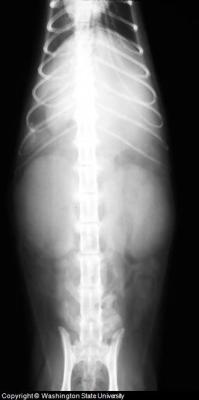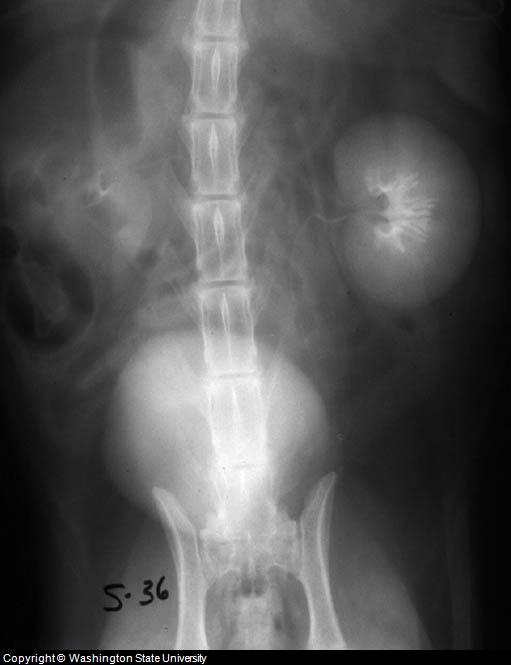Cat Kidney Problem
"Cat kidney problem concerns relate to a number of important excretory and hydro–regulatory functions this organ has to perform. Chronic renal disease (CRD), chronic renal failure (CRF), and chronic renal insufficiency all refer to cat kidney problems. Infections, calculi, cancers and renal failures are some common feline kidney problems usually noted. Typically, polydipsia (increased thirst), Dysuria (reduced urination), Oligouria (increased urination), hematuria (blood in urine), anorexia, depression, abdominal pain, diarrhea, vomiting and dullness are some common symptoms associated with feline kidney problems. These symptoms can be termed as non–specific which means they don't indicate the exact kidney problem. Urinalysis, radiography and detailed biochemical profiling are usually required to diagnose the exact feline kidney condition. Treatment options range from the use of drugs to surgery and diet management. Support with natural remedies and herbal preparations along with specific drugs used for symptoms can significantly improve a cat's condition."
Different forms of Cat Kidney Problem:
A cat’s kidney might become unable to work properly if any problem directly or indirectly interferes with its functioning. Different health issues related to the urinary system of felids (cats) have been identified as the primary reason for cat kidney problem. Different cat bacterial infections, whether direct or those that ascended from the bladder, cancers, obstructions, calculi or stones, renal tubular insufficiencies and a disturbance in the components of blood levels of different substances and hormones can end up with a severe problem in the kidney.
It is believed that older cats are more vulnerable to feline kidney problems. Parts of the kidney, particularly the nephrons (cells responsible for filtration, waste excretion and water regulation) expire with age and cannot be regenerated by the body on its own. Thus older cats have a higher frequency of kidney problems.
Renal (kidney) dysfunctions i.e. problems related to the failure of an organ or part of it to perform its primary function e.g. filtration; occurs due to infections, calculi (mineral deposit blockage), congenital blockage and glomerular disease (inflammatory disease in the kidney). These problems are purely related to glomerulus and Bowman’s capsule of nephrons (structure in the kidney). A feline kidney problem of this kind can be acute (sudden) or chronic (severe). In either case it can result in complete cat kidney failure.
Renal Tubules are part of the nephrons which are related to the resabsorptive mechanism of solutes and water from the urine. Some of the most important cat kidney problems such as renal acidosis, glucosuria and obstructive problems of the feline kidney originate within these renal tubules.

Picture of Enlarged Cat
Kidney
Neoplasia, which is uncontrolled cell growth or cancer, is a highly uncommon condition. In fact, those neoplasms that affect a cat’s kidney are secondary in nature, meaning they spread from another organ in the body. Lymphosarcoma is one such example, which causes the formation of lesions over the kidney, if it metastasized or spread. Other types of cancers such as adenocarcinomas, nephroblastomas and transitional cell carcinomas may also occur but it is estimated that only 0.3% of all cancers are those related to a cat’s kidney.

Picture of Cat Kidney Cancer Mediastinum Cancer (middle of chest)
Cat Nephritis and Kidney Diseases are the two of the most commonly occurring feline kidney problems. Different species of bacteria, inflammatory responses, hypersensitivity, hormonal imbalance, calculi and some viruses are the cause of nephritis and acute or chronic cat kidney disease of an unspecified cause. These conditions also cause generalized illness in affected cats.
Symptoms and Diagnosis of a Cat Kidney Problem:
There are some typical symptoms associated with urinary problems; some of them are increased thirst, reduced or increased urination, frequent urination, pain, vomiting, diarrhea, passing of blood in urine and depression. All these or some of them may occur in any type of feline kidney problem. Unfortunately all of them are relatively non specific for or indicative of a kidney problem. It is thus recommended that along with detailed a clinical examination, a confirmatory diagnosis should be based upon laboratory results.
Urinalysis is the most effective and initial step required to diagnose a possible cat kidney disease. Detailed studies of urine samples for pH, consistency, components and physical appearance are some basic requirements of urinalysis. Some advanced tests such as culturing, isolation and detection of any of particular component of the urine to determine a possible cause may be required. Radiography on the other hand not only confirms the anatomical status of the kidney but also it is an effective tool for confirming various renal (kidney) conditions such as calculi, inflammation and metastasis or spread of feline kidney cancer.
Treatment of a Cat Kidney Problem:
The underlying cause of any of renal kidney problem is compulsory or required in order to resolve any symptoms and to prevent the condition from worsening. Even minor issues related to the urinary tract, upper or lower, should not be ignored or left untreated as these can lead to an incurable cat kidney failure as each unit of renal activity, i.e. nephrons, cannot be repaired or regenerated.
Different drugs including antibiotics, diuretics, renal dilators, NSAIDs etc have been used for treating different conditions. Similarly, in some cases such as cat renal cancers, calculi and obstructive uropathy, surgery may be considered to be the primary treatment option. In cases where a cat kidney problem ends up with feline kidney failure, removal of the kidney and transplantation may be required.
Symptoms can be treated with specific drugs, similarly natural remedies such as Kidney Support, can help to restore a cat's condition help with kidney function. This is not a replacement for a specific conventional treatment required to resolve any of the cat kidney problems identified. References: Merck Veterinary Manual (Merck & Co. 2008)
References:
The Merck/Merial Manual for Pet Health
Washington State University College of Veterinary Medicine
Have A Question about a Cat Kidney Problem or Have a Story That Will Help Others?
Do you have a question or story about a feline kidney related problem? Share it and our veterinarian will answer it for free.
If possible, please include a picture and include information such as breed, age, sex, medical history, changes in behavior, products used, indoor or outdoor etc.
We receive many questions, so it might take a while to response. If you have an urgent question we suggest using this online cat veterinary answer service that is available 24 hours a day. You only pay for answers you like.